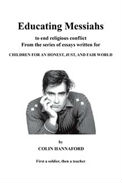
 |
At 17, Colin Hannaford joined the British army. Twelve years later, now a staff officer, his protest at his government's attempt to use military force to solve a major social problem led to him being held for some weeks in a military psychiatric hospital. Though an unjust holding, there he experienced a religious awakening, similar to that of the great Catholic Theologian, Thomas Aquinas. In asking for God's help, Hannaford recalled a strong embracing figure responding "How can you be afraid? You are of me." Told to "Be honest!", it was a message that Hannaford soon realized was meant for everyone.
As a retired math teacher from the European Union School in England, this beloved instructor gathered with former students at a reunion and was invited to share with the world the open dialogue he had encouraged in the classroom. Those collected thoughts, essays, and the detailed narrative of his theophany serve as the basis for Hannaford's insightful and inspiring compilation, Educating Messiahs.
While primarily written from an academic's point of view—those well-versed in math, science, and religion will certainly have a more comprehensive edge—Hannaford's comments like "chocolate fudge cake and intellectual challenge: an unbeatable combination" do help lighten the erudite load. Through decades of classroom experience, the author identifies that students won't learn until they are ready to do so. With knowledge that good stories grab attention, readers are subsequently entertained with Hannaford's humorous antics about attempting to board a London bus. "Lately I have realized that a messiah is simply someone who is honest and asks questions." This simple definition clearly resonates at the heart of this work. At the core of his teaching, students learn cooperation, communication, and perhaps most important, tolerance and concern for others.
Hannaford has participated in numerous lectures and conferences around the world. In 2009, he was a recipient of the prestigious Upton Sinclair Award—given in recognition of his development of the Socratic Methodology, a philosophy which promotes thought, discussion, and questioning in the classroom. In a broader sense, these techniques are intended to help solve world conflict. His publishing credits also include a Socratic Workbook, Teachers' and Parents' Guide, and a personal memoir designated as 473959—Hannaford's Army ID.
Clearly a well-read, thinking man, Hannaford's reflective thought is often inspired by the work of writers, philosophers, scientists, and theologians. He purposefully assimilates the ruminations of many renowned minds into his own meditative dialogue. Whether discussing religious ideologies, tracking the nature of "The Beast" (i.e. the habit of war that plagues humanity), exploring black sphere theory, or stressing the importance of imagination as a connection to free will, Hannaford incorporates a rich amalgam of scholarly and creative references. Among others, the extensive roster includes Albert Camus, Sigmund Freud, Nietzsche, Shakespeare, and Stephen Hawking. In a milder gesture, the author taps into the writing of A.A. Milne of Winnie-the-Pooh fame, entertaining the audience with a lesson about the quest for truth. On a similar note, Hannaford delves into analytical left brain thinking, stressing its importance over right brain thought, which harbours old habits and rote behavior. The concept calls to mind Betty Edwards' popular drawing book that focuses on right and left brain theory as a means of enhancing creativity. While the author's writing style ranges from didactic to personal, there are moments when his translations are offered as poetic verse to consolidate an idea.
At a Jewish celebration, Hannaford talked about changing the world with a generation of messiahs. As conflicts, often of a religious nature, continue throughout the world, hopefully more educators will take up this book and Hannaford's cause, to ignite a vocal classroom. Ideally such basic efforts will someday translate into a more peaceful and harmonious global realm.